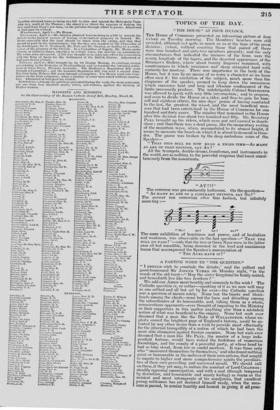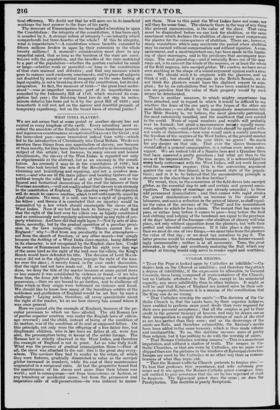A PARTING WORD TO "THE QUESTION."
"I snotrLD wish to conclude the debate," said the gallant and good-humoured Sir JOSEPH YORKE On Monday night, "in the words of the old toast—" May the sister kingdoms be firmly united, and henceforth live like two brothers ! "
We add our Amen most heartily and sincerely to the wish ! The Catholic question is, or rather—speaking of it as we now well may as one settled and all but set by for ever—the Catholic question was a question of means solely. None but the bigots and block- heads among the chiefs—none but the base and drivelling among the subordinates of its honourable, and, taking them as a whole, conscientious opponents—ever thought of imputing to the Ministry or their supporters in this matter anything else than a mistaken notion of what was beneficial to the empire. None but such ever dreamed that a man like the Duke of WELLINGTON, whose ex- ploits crowd the brightest page of England's history, could be ac- tuated by any other desire than a wish to provide most effectually for the internal tranquillity of a nation of which he had been the most able champion against foreign enemies. None but such ever dreamed that a man like Mr. PEEL, the master of a large inde- pendent fortune, would have risked the forfeiture of numerous friendships, and the enmity of a powerful party, at whose heed he had so long stood, from low or sordid motives. It was those only who "measured themselves by themselves," and who found nothing great or honourable in the motives of their own actions, that sought to impute to higher and more comprehensive spirits the peculiari- ties of their own grovelling and narrowed minds. We should call on these, if they yet may, to imitate the conduct of Lord CHANDOS : steadily opposing emancipation, and with a zeal (though tempered by discretion, and honourable and manly feeling) as warm as the noisiest and most intemperate of his coadjutors, that excellent young nobleman has yet declared himself ready, when the mea- sure is passed, to concur heartily and honest in giving it all pm- tical efficiency.. We doubt not that he will soon see in its beneficial workings the best answer to the fears of his party. The measure of Emancipation has been called a breaking in upon the Constitution : the integrity of the constitution, it has been said, is assailed by it A strange notion of. integrity !—an integrity which comprehends but three-fourths of the whole ! If this be integrity, what is imperfection ?—A constitution whose benefits extended to fifteen millions broken in upon by their extension to the whole twenty millions ! A moment's consideration must show to any impartial mind, that so long as the burdens of the state are coex- tensive with the, population, and the benefits of the state restricted to a part of the population—whether the portion excluded be small or large—whether weak or powerful—so long is the constitution of that state maimed and defective ; and that any measure which goes to remove such exclusory enactments, and to place all subjects • not disabled by moral or natural incapacity on the same footing of legal equality, is not a breaking down of the constitution, but its red- , integration. In fact, the measure of 1688—" the great least under- stood "—was an imperfect measure : part of its imperfection was remedied by the Indemnity Bill of 1749, 'which received its com- pletion last year ; the finishing hand (we do not stay to notice minute defects) has been put to it by the great Bill of 1829; and henceforth it will rest not on the narrow and doubtful grounds of temporary expediency, but on the broad basis of eternal justice !



















 Previous page
Previous page